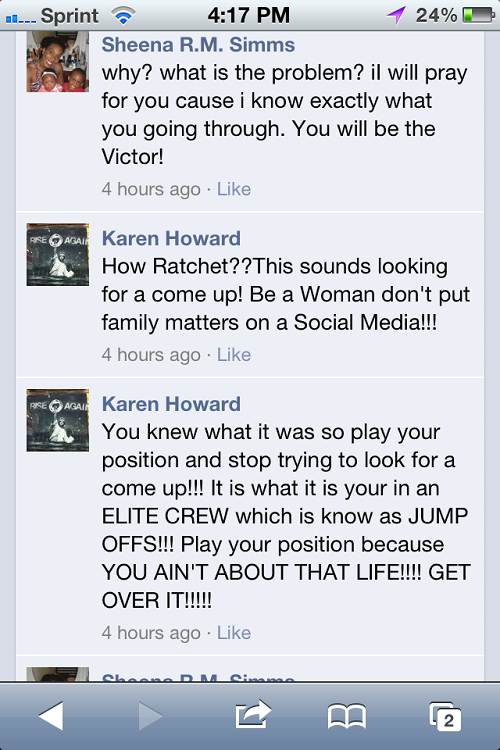WTF AFRICA- MAN BEAT OUT WIFE CLAAT

Man Thoroughly Beats Wife and Mother-in-law Over Wife’s Secret Child0 Comments
A Binga man who had forgotten that the in-laws deserve to be respected found himself in murky waters after bashing his wife and mother-in-law. The man also demanded bride-pice back after allegedly discovering that his wife had a five-year-old ‘secret child’.
Fortunate Sibawa (33) reportedly thrashed her mother-in-law and wife after discovering that his wife Lydia Dube had kept it a secret that she had a five-year-old daughter when they got married. Sibawa was hauled before Binga magistrate, Mr Stephen , facing assault charges. He pleaded guilty to the charges saying the two had ‘defrauded’ him.
Sibawa alleged that the Dube family defrauded him in the sense that they charged him a lot of money for bride price AS IF THEIR DAUGHTER WAS A VIRGIN. It is reported that on 11 June, the accused arrived at their matrimonial home late at night from a beerhall and when his wife served him food, he refused to eat accusing her of being a liar. Sibawa told her that someone at the beerhall had told him that his wife’s supposed younger sister was in fact her daughter.
The woman tried to dismiss the ‘rumour’, but her husband turned a deaf ear and demanded that they confront his mother-in-law about the issue. Realizing that she was not winning the argument, Dube gave in and they proceeded to her parent’s homestead. Upon arrival, the furious Sibawa ordered the old woman to tell him the truth, threatening to kill them.
Trembling in fear, Dube’s mother confirmed that her daughter had a child before she married Sibawa and the issue was kept under wraps because they feared he would refuse to marry her. In a fit of rage, Sibawa thoroughly thrashed up the two. The matter was reported to the police leading to the arrest of the accused and the magistrate ordered the two women to produce medical reports as exhibit.
RELIGION IN THE BIBLE- GOODMORNING
Religion in the Bible
[This article was taken from Chapter Six of Bible Manners & Customs by Rev. G.M. Mackie, M.A, 1898 (which we have revised and reprinted)].
Religion is the great fact of Eastern life. “…of him, and through him, and to him, are all things…” (Rom. 11:36)—this is the acclamation of everything that lives in the East. Christianity, Judaism, and Islam have many deep distinctions, but they are all one with the regard to the existence and power of God. In the East, to be without religion is not an intellectual viewpoint, it is a moral void. Skepticism is still regarded as the self-defense of a disobedient heart (Ps. 14:1). To try to prove or to deny the existence of God are considered almost equally frivolous.
So strong and universal is this conviction with regard to the glory of God’s name, that if the Missionary Gospel could only find an entrance into the mind and heart, and cause love to be added to faith, the East might again send forth a wave of religious influence that would carry blessing to the world. Eastern religion has a heart of profound reverence, but it is almost paralyzed by superstition, fatalism, and formality.
(A) Superstition. By multiplying the mediators between God and man, Eastern Christianity has fallen into an error from which Judaism and Islam are comparatively free. [1] Faith in amulets is, however, common to believers of every faith, and the power of the evil eye and the discovery of secret things by means of witchcraft are widespread superstitions in every religion. The person who reveals secrets by necromancy or communication with the dead is called in Arabic a “seer.” This name and practice go back to the days of Samuel. [2] In 1 Samuel 9:7, an embarrassment arises about consulting the man of God without having a present to give him. The word translated “present” means in Hebrew and Arabic, a direction fee, and the creation of this technical term implies that such appeals to the seer were popular and had a recognized value. Another similarity that shows the continuity of these dark traditions is that the Hebrew name for a wizard, “one who knows,” is in the living Arabic of today “one who tells.” Again, when the Bible speaks of a man or woman with a familiar spirit, the term means one who makes use of a bottle. [3] This is explained by the modern practice in the East. If a sum of money disappears in a house, the witch who is summoned to reveal by whom it has been stolen and where it is hidden always brings an empty bottle with her. By this medium she professes to appeal to the dead relatives of the party who has lost the money, and audible answers are declared to proceed from the bottle.
(B) Fatalism. The doctrine of fate is constantly resorted to, not only in submitting to the inevitable, but also in excusing carelessness and indolence. It is close to impossible to change personal disposition and public custom. Thus, today Jews believe they fulfill their righteous duty by following Jewish traditions, and the same with the Christian and Moslem. They all admit that the supreme end of religion is to glorify God, but the way to that end is rutted and blocked by the transport wagons of ceremonial and legal regulations.
Israel has the certainty of the commandments, and to this Islam adds the duty of submission, but only the Gospel of the grace of God can change the outward law into inward preference, and self-surrender into perfect freedom. It is the hope and prayer of the Christian Church, which sends its missionaries to labor in Syria and Palestine, that God may speedily bless the means used towards the accomplishment of this great result. God has not cast off His ancient people, it is not His will that Ishmael should perish, nor is it in vain that the Christian name has been preserved through centuries of trial and oppression. There is blessing in store for the land in which “…the Word was made flesh, and dwelt among us….”
Even now the religious thought of the East teaches a lesson that is often greatly needed in more Christian lands. Those who have handed down so much of the outward form from ancient times have also preserved this inward truth: the mission of religion is not so much to satisfy the highest claims of the intellect as to supply the deepest needs of the heart. In the West, God does a certain thing because He is good; in the East, the same thing is good because He has done it. However, God is greater than either the East or the West, and they have much to learn from each other. The East shrinks from prescribing what God must do. There can be fatalism in definitions as well as in destiny. It is hard to enclose the purpose of eternity in the formula of a day. [4]
(C) Formality. While formality abounds in the Eastern Church as well as in the Synagogue, its illustration in the latter is of greater interest in this study because of its connection with biblical history, and because it shows things that are preferred to the still rejected Gospel of the Lord Jesus Christ. The life of a Jew is religious from the cradle to the grave. In the room occupied by the mother and her newborn infant the rabbi puts a paper containing Psalm 121 in Hebrew, with a prayer for the favor of Adam and Eve and the good angels, and an anathema against the power or approach of Leilith, the demon of the night.
After completing his thirteenth year, a Jewish boy is taken by his father to the synagogue, and there made “a son of the Commandment.” [5] The father thanks God for release from moral responsibility over the boy’s actions, as he has now received the spirit of discernment between good and evil (cp. Phil. 1:9 and 10). When the Jew rises in the morning he puts on under his vest the small tallith or prayer cloth with its sacred fringes, and goes through the prescribed morning devotions in the house or synagogue.
There are set and separate graces in Hebrew that are to be spoken in connection with bread, meat, wine, and fruit. Those for scents are specialized as adapted to bark, blossoms, leaves, or fragrant powder. There are similar phrases for the sight of anything beautiful or wonderful in nature, for hearing a wise saying, or meeting a man eminent in piety. These are all learned by heart during childhood, in a language that is not used for common conversation and daily life.
In the house, on the right hand doorpost of each inhabited room, there is the mezuza, a small box containing the commandment in Deuteronomy 6:4-9. The custom may at one time have had a beautiful significance as a reminder of the unseen Guest in the house whose presence should control and hallow all that is said and done in it, but it is now merely an amulet or charm protecting the sleepers against the entrance of any demons of the night. Outside of the house there are the synagogue prayers for morning, afternoon, and evening, with special additions for the weekly Sabbath and the religious Festivals. The service of God is always presented as a law that has to be carried out both in its evident meanings and in the far-fetched and often facetious inferences draw from them. Rabbinical teaching resembles a statute on copyright or hunting laws. Thus, with regard to the sin of boiling a kid in its mother’s milk (Exod. 23:19):
(1) The dish itself is utterly prohibited;
(2) To guard against the accidental mingling of milk and meat, the same vessel must not be used for both things;
(3) There must be an interval of time between eating meat and milk;
(4) If the former be eaten first, the interval must be longer, as it takes longer to digest;
(5) Curded milk must be classified as meat because it contains rennet.
For the rabbis, drawing such far-reaching inferences from a hypothetical case deepens the spiritual life. It is profoundly natural that after such rules are all carried out, a loving heart should say, “what lack I yet?” (Matt. 19:20).
Apart from the regulations about special matters and the weekly Sabbath, the religious life of the Jews is controlled by the cycle of the sacred Festivals, and can be best illustrated by a brief description of them and the manner of their observance. At every turn we shall have to notice how “the letter killeth” (2 Cor. 3:6), but as we do so, let us remember that the same loveless formality which has brought this blight on the natural branches may do as much or more to the engrafted ones.
There are eight principal Festivals, five of which have their origin in the Pentateuch. [6]
(1) Passover (Exod. 12:1-14; Lev. 23:4 and 5; Num. 28:16; Deut. 16:1-7). The 14th of Abib (called Nisan after the exile; Neh. 2:1; Esther 3:7). This falls in our late March or April, and celebrates the blood atonement of the Lord and the fact that families that had blood on their doorposts were protected by God and allowed to live, having been passed over by the angel of death. This is one of the three times during the year that Jewish men were required to go to Jerusalem (Exod. 23:14-17).
Before Passover, there is a time of great preparation and rejoicing in the Jewish families. Then on the 14th day of Nisan, the Passover lamb is slain, commemorating the day in which the lamb was slain in Egypt (Exod. 12:6). Sunset ends the 14th day, and begins the 15th, which is when the Passover meal is eaten and the Feast of Unleavened Bread begins. By sunset everything is ready for the feast and celebration. The thorough cleansing of the house is over, the members of the family are dressed in new clothes, and through the fastened doors and windows in the Jewish quarter of the town one hears on every side the high nasal swing of many voices reading Hebrew in concert.
The Samaritans alone keep up the custom of roasting lambs according to the original directions, but all those who celebrate Passover have the bitter herbs, usually dandelion leaves, and the mortar-like sauce with which they are eaten in remembrance of the bondage in Egypt. During the reading, the head of the family explains the circumstances commemorated, and asks each of the young sons present where he is going, and receives the answer, “I am going from the land of Egypt to the land of Jerusalem.” This form is used because the names Mizraim and Yerushalaim (Egypt and Jerusalem) form a rhyme. Four cups of wine are served during the celebration. For obvious reasons of comfort and decorum, the wine is diluted with water. It must be of the best quality obtainable, and free from Gentile contamination. The poor may use raisin water.
During the time of preparation great care is taken to rid the house of leaven (yeast) and leavened bread, and every utensil used for making, holding, or carrying it. When the house has been thoroughly searched and cleansed by the women, the master makes his official and solemn search. As he does so in the name of God, a piece of bread is laid in a conspicuous place so it can be “discovered,” as though, if he found nothing, it would be like taking God’s name in vain!
Sometimes a man is engaged to buy everything in the house that is fermented or that might become so, such as vinegar, wine, syrup, and preserved fruits. He then asks to have the things he bought left in the home until he calls for them. He calls after the seven days of the feast are over and sells them back to the family for the same amount. During the interval, the articles in question did not technically belong, according to the rabbis, to the family! In making the unleavened bread, the modern Pharisee has a piece of muslin put over the mouth of the jar in which the water is brought from the fountain in case a crumb of common brew might accidentally float into the vessel. Sadly, nothing is ever said about keeping the feast in the spirit of 1 Corinthians 5:8, i.e., with sincerity and truth.
(1) [7] Feast of Unleavened Bread. (Exod. 12:15-20; Lev. 23:6-8; Num. 28:17-25; Deut. 16:8). This is a seven-day feast that starts on the 15th of Nisan, the same evening that the Passover meal is eaten, and lasts for seven days. This feast follows the Passover sacrifice which has occurred only a few hours earlier, before the sun went down. The Passover meal actually starts the seven-day Feast of Unleavened Bread. The Passover celebrates our atonement, and the Feast of Unleavened bread reminds us of our walk before Him, which is to be without leaven, i.e., holy. Leaven usually represented evil in biblical thought, and to have one’s life free of leaven was to be free of sin and evil. During the seven days of the feast there was to be no leaven anywhere in the house. Paul uses the well-known examples of the Passover and Feast of Unleavened Bread to remind Christians that, since Christ has died for us, we should walk in sincerity and truth:
1 Corinthians 5:7 and 8
(7) Purge out therefore the old leaven, that ye may be a new lump, as ye are unleavened. For even Christ our passover is sacrificed for us:
(8) Therefore let us keep the feast, not with old leaven, neither with the leaven of malice and wickedness; but with the unleavened bread of sincerity and truth.
The first and last days of the feast are days of rest, or special Sabbaths. By New Testament times, the word “Passover” was usually used to refer to both the Passover and the seven day Feast of Unleavened Bread.
(2) Pentecost (Lev. 23:15-21; Num. 28:26-31; Deut. 16:9-12), or Feast of Harvest (Exod. 23:16) or Feast of Weeks (Deut. 16:10). This is the second feast in which all the Jewish men are to appear at Jerusalem. It occurs fifty days after the wave offering that occurred during the Feast of Unleavened Bread, and falls in May or June. In the synagogue the appointment of the seventy elders is commemorated (Exod. 24:1; Num. 11:16). [8] An offering of new grain as well as other offerings was to be made to the LORD (Lev. 23:16ff). It was on the Pentecost after the death and resurrection of Christ that the gift of holy spirit was poured out, people spoke in tongues for the very first time, and the Christian Church started.
(3) The ninth of Ab (also known as Av). This is kept in remembrance as the dark day on which both the first and second Temples (Solomon’s Temple and Herod’s Temple) were destroyed. To commemorate it the furniture in the synagogue is overthrown and littered about, and the worshippers fast and have their clothes soiled and disordered. The book of Lamentations is read, and prayer is offered for the coming of the promised Deliverer.
(4) The Feast of Trumpets (Lev. 23:23-25; Num. 29:1-6). This occurs on the first day of Tishri (also called Ethanim) and is the first day of the secular year (Tishri falls in September and October). It acquires religious importance as the first of the ten days of repentance before the Day of Atonement. Jewish tradition teaches that on this New Year’s day the names of those Israelites who are to die during the current year are written down in the Book of Death, and the names of those who are to survive are written in the Book of Life. The opportunity afforded by the ten days is that of having one’s name possibly transferred from one book to the other by means of increased attention to prayer, penance, and the rules and claims of the synagogue. This superstition is superior to that of the Roman Catholic Confessional and Mass, inasmuch as the decision rests with God and not with the priest, but it serves the same purpose of moral intimidation and mercenary pressure, and represents blessing as something that is laboriously wrung from God.
(5) Day of Atonement or Yom Kippur (Lev. 23:26-32; Num. 29:7-11). This day, Tishri 10, is one of special solemnity. Jews who do not go to the synagogue during the rest of the year are present and take part in the all-day service. White cocks and hens are killed, symbolic of forgiveness and purity. White clothes are worn for the same reason, and the whole day is spent in reciting prayers of humiliation and penitence. The vehement gestures and voices choked with sobs make the stranger feel that he is looking upon the anguish of some great bereavement. It is like a soul trying to recover a lost instinct or re-enter some previous state of existence. It is the annual pageant of penitence, but it is powerless to change the heart (Heb. 10:3 and 4). It was on this day that the High Priest twice entered in to the Holy of Holies, once to atone for his own sins, and then to atone for the sins of Israel.
(6) The Feast of Tabernacles (Lev. 23:33-44; Num. 29:12-40; Deut. 16:13-17). This is the third and last time in the Jewish calendar year that every Jewish male is to appear before the LORD in Jerusalem. The Feast of Tabernacles begins on the 15th day of Tishri and lasts 8 days. It was the harvest celebration for the harvest of the fruits of the summer, especially raisins, figs, and olives. During the eight days of this feast the Jews erect tabernacles or booths of branches, and calico awnings on the balconies and flat roofs of their houses, and take their meals there. The booths reminded the Israelites that they had to dwell in booths when God brought them out of Egypt.
(7) The Feast of Lights or Feast of Dedication (John 10:22) or Hanukkah (“dedication”). This feast occurs on the 25th of Kislev (usually our December). It commemorates the rededication of the Temple and the restoration of its services after the Greek ruler, Antiochus Epiphanes (175-163 B.C.), had desecrated it by among other things, offering a pig upon the altar. The Jews won back Judah and Jerusalem in the Maccabean revolution, and rededicated the Temple in 165 B.C. It lasts eight days and is called the Feast of Lights because there are eight candles lit, one on each of the successive nights of the feast (though this custom differs somewhat). The lighting of eight candles is in celebration of the belief that, when the Temple area was reconquered and rededicated, there was only enough oil to keep the Menorah burning for one night but, miraculously, the oil burned for eight nights until more could be provided.
(8) The Feast of Purim (Esther 9:19). This feast is held on the 14th of Adar (usually March). The scroll of the book of Esther is read in the synagogue, and when the name of Mordecai is read the listeners shout blessings, but when the name of Haman is read, there are shouts of imprecation. It is the Gunpowder-plot Day of Jewish history with Haman as conspirator. His effigy is made and pelted by the children, and the rich send gifts of food to the poor so that all Israel may rejoice. It is customary to say of a well-furnished table or a hearty meal that it is a Feast of Purim.
The synagogue service and festivals are primarily valued by the Jews as a means, the only one left to them, of declaring and preserving their distinction as a race. They become the substitute for, rather than the support of, true religious feeling, because every commemoration of the past finds its contradiction in the facts of present-day circumstance. Thus, Passover recalls the fact of the national name and place to those who have neither. [9] The agricultural feasts of Pentecost and Tabernacles are celebrated by those who shrink from manual labor. The Jew is proverbially the emigrant and wanderer of the earth, but he daily recites in his Prayer book, “Lord, I thank Thee that Thou hast not made me a foreigner.”
It is a strange anomaly that the national bond of union should be found in those very formalities that emphasize the fact of the people’s severance from their original conditions. There is much in these particulars that should appeal pathetically to the sympathy of the Christian who knows that what is needed is God’s gift of pardon and righteousness and the constraining love of Christ.
Perhaps the crowning instance of such contradiction between the past and the present is seen at the close of the synagogue service, when the priest’s face is veiled with the tallith as he pronounces the benediction of Moses (Num. 6:24-26). This precaution is observed lest the utterance of the words of Moses by one occupying his place should bring up the glory that shone upon the face of the great lawgiver, and so strike the people dead.
This tyranny of empty form, and the limiting to one nation of what God has thrown open to the whole world, gives to the Christian Church its missionary duty towards Israel. It is the message of the younger brother who once wasted his substance to the elder who is now in danger of being impoverished by his (Luke 15:11-32). This exclusive claim to God’s favor was, and remains, the line of cleavage between the synagogue and the church. It is zeal, but not according to knowledge; for the truth the Jews reject is that God’s glory is exhibited in the saving of all nations (Acts 2:21-39, 3:25, 10:28-43, 13:47, 14:27, 17:26 and 27, 22:21 and 22; 1 Tim. 2:7).
Palestine is a land of sacred memories. Some of them still retain the tones of the living voice, while others are bleached and faded inscriptions, recording on the tombstone what was done when the breath of life was warm. The great truth of personal religion which the East has taught through the centuries by symbol and sacrifice, and often debased by formality and superstition, is that God entrusts His power to those who entrust themselves to Him. The story of its institutions and their expansion from primitive times is an unfolding of the great social law that the individual exists for the family, the family for the nation, the nation for the world, and the world for God.
With regard to the Bible itself, this study of manners and customs has set before us a great array of surviving thoughts, habits, and institutions that explain and confirm the allusions to similar details in the Bible. It has shown us how fully and familiarly the message of revelation was adapted to human circumstances. The impression thus left upon the mind is that the Bible is a book that is meant to be studied, and to be taken on its merits as a record of the past, and above all that it is to be loved and reverenced as the voice of Him who through it speaks forever, and to all nations.
WHY I JOINED THE CHURCH OF SATAN(WILL MAKE TWO POSTS, THIS IS FOR THE READERS WHO BELIEVE IN GOOD AND EVIL)

“Before I joined the church of Satan, I sacrificed a baby, I drank blood and so many other things, which I shouldn’t have done. I also sold myself to the devil for fifty years.”
This confession summed up the story of a 29 year old businessman who in his quest to be rich joined four occult groups where he committed the worst of abominations.
At 21, Steven Kofi (not real name) from West coast in Ghana, began his journey into the occult world by joining the church of Satan international before going deeper to join others such as the score and bone cult, region of doom and free mercy debunked all in his bid to make wealth.
A once vibrant man with wife and a child along with a prospering oil business had to abdicate his matrimonial responsibility to his wife for eight (8) years after sacrificing his manhood as a condition for wealth.
Faced with the threat of death after being given a 49 day ultimatum to live, the Ghanaian ran after God and recently got a relief in Lagos during the Lord’s Chosen Church programme, “Time To Recover All” where Saturday Sun had an encounter with him.
How did he join such groups at an early stage in life? “The story started in my final year at the university of Ghana, I was studying oil and gas engineering, I got my master degree in oil and gas engineering. At the final year, things were so tough for me that I needed to finish my education, but there was no way to get financial help, at the end of the day I consulted my parents but it was fruitless”, he stated.
According to him,“usually I chat with somebody on the internet that helps me with money. He is a man and that was before I later got married to a Norwegian lady in 2003. We had a kid before she travelled, but she usually call me on phone once in while, at that time, I called her for financial help but she didn’t have any cash.”
He said the person who used to assist him complained that he could not continue sending money to him, and as such, he has to fend for himself. “He told me that he cannot continue sending me money. He said I have to work for myself, and I asked him, how, he said you have to do it on your own”, he stated adding that from that point he decided to locate the church of Satan in Ghana where he was told that his initiation would be done in far away Califonia, USA. In deed, travel documents were prepared for him and he travelled to ground Lodge at Early Noise in Califonia where his initiation took place.
He said after the initiation process, he demanded to see the devil, and was asked to write a request letter to the devil which he did. His request was granted within two weeks, and he was able to meet face to face with the devil who asked him to make three wishes, adding that his third wish for long life could not be granted because church members only live within the space of thirty years after joining the church of Satan.
“The devil demanded that I make three wishes from him, which I consented to, that I want to be famous, wealthy and live long, but the third one he refused to grant, disagreeing to the idea that any one that joins the church of Satan will always live for thirty years, once you join at 20, you live till 50. This I agreed to because I was eager for money”, Kofi stressed.
He further disclosed that after joining the church of Satan, Satanic Bible was made available to him, sword of slaughter, initiation glove, Suit and other items. He however explained that he didn’t lose his manhood until he added another feather to his cap in the occult world by joining yet another group. “When I joined the Score and bone society, that’s when I sacrificed my manhood to increase my wealth”, he added.
Beside the monetary gains from the cults, he was also sent on an assignment which is to win souls for the kingdom of Satan. Through this, he has won more than 23 souls for Satan, using the advantage of the wealth he was given. “Boys and girls who are eager for money, wealth, I show them the way. I have offices in Port-Harcourt, Warri, Abuja, Ghana, I give them what to do and they begin to make money on their own and also teach them how to join and I send them over”, he added.
How did this bring joy to his parents? Kofi said after making money, he decided to open a plaza for his mother in Ghana, but she rejected the offer, claiming that it was a blood money, because of her attachment to Christ and a vision she saw in which she saw the source of his wealth. But his father and siblings accepted him.
His trouble however started after he became uncomfortable with his life. At that point, he began to look for powerful pastors that could save his life. When his cults discovered he was going astray, he was penalized and given only 49 days to live. “I was given 49 days to live, I have spent 19 days, and it remains 30 days, before deliverance came to me through Pastor Mouka of the Lord’s Chosen”, he stated.
Having learnt some bitter lessons, Kofi is advising youths not to covet what others have while urging parents to restrict what their children watch on television screens. On his manhood that was restored during the deliverance session, Kofi said “I give God all the glory that my manhood was restored back, am happy now that I can make more babies again.”
****RULES**** 1. Debates and rebuttals are allowed but disrespectful curse-outs will prompt immediate BAN 2. Children are never to be discussed in a negative way 3. Personal information eg. workplace, status, home address are never to be posted in comments. 4. All are welcome but please exercise discretion when posting your comments , do not say anything about someone you wouldnt like to be said about you. 5. Do not deliberately LIE on someone here or send in any information based on your own personal vendetta. 6. If your picture was taken from a prio site eg. fimiyaad etc and posted on JMG, you cannot request its removal. 7. If you dont like this forum, please do not whine and wear us out, do yourself the favor of closing the screen- Thanks! . To send in a story send your email to :- [email protected]









Recent Comments